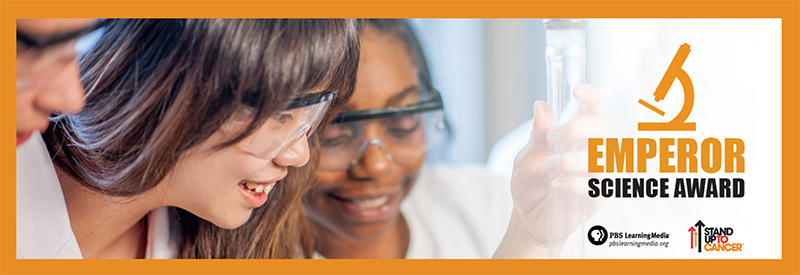Katie Neary was selected as one of 100 high school students from across the U.S. awarded for their passionate essays detailing the need to find a cure for cancer
Recipients of awards made possible by grants from Genentech, Bristol-Myers Squibb and Novartis
Bethlehem, PA, March 8, 2017 – Liberty’s Katie Neary was announced as one of 100 award recipients for the third year of PBS’s and Stand Up To Cancer’s Emperor Science Award program. The program is designed to empower high school students to become the next generation of scientists as they explore careers in cancer research and care through a unique mentoring opportunity. Three of the Awardees are students receiving support for a second year of mentorship, as allowed by the program.
PBS and Stand Up To Cancer, a division of the Entertainment Industry Foundation, received nearly 600 applications from eligible 10th and 11th grade students in 28 states throughout the U.S. who are interested in pursuing a career in science research. Prominent scientists served as judges and evaluated the students’ applications: written essays submitted online this fall, addressing how cancer has affected them or their communities; how science can help find a cure for cancer; and, if they are able to become cancer researchers, what scientific fields would they study and why.
Liberty High School is proud to recognize Katie Neary as an Emperor Science Award recipient. Katie was chosen from a pool of hundreds of 10th and 11th grade students from across the country that are interested in pursuing a career in science and cancer research.
Katie learned that she has been paired with a cancer researcher at Children’s Hospital of Philadelphia, who specializes in studying the late effects of cancer treatment in children. Katie is hoping for a career in pediatric oncology, so this pairing could not have been better for her. This summer Katie will be collaborating on a research project with the doctor – they will be setting up the goals of the project together in the coming weeks.
The 100 Emperor Science Award recipients will work with an esteemed university scientist on a rewarding multi-week cancer research project, receive a Google Chromebook computer to enhance their studies and to facilitate mentor access for those students who live at a distance from their mentor’s research facility, and a $1,500 stipend for expenses. Those entering the program for the first year will also have the opportunity to apply for a second year.
Students from rural, suburban and urban communities in 28 states comprise the third class of Emperor Science Awardees. These students demonstrated awareness of emerging developments in cancer treatment, including precision medicine, immunotherapy and epigenetics, and have an impressive range of research focuses and interests, including nanotechnology and engineering, basic cellular biology, gene mapping, bioinformatics, DNA splicing and computational sciences.
The Emperor Science Award Program extends the learning and outreach for the PBS documentary, Ken Burns Presents CANCER: THE EMPEROR OF ALL MALADIES A Film by Barak Goodman.
The Emperor Science Award Program has been made possible by generous financial support from Founding Donors Genentech, a member of the Roche Group, Bristol-Myers Squibb Company and Novartis. Their support will fund a total of 300 awards through the first three years.
The full list of Emperor Science Award recipients is available at www.emperorscienceaward.com. For more information on PBS LearningMedia, visit www.pbslearningmedia.org.


